英语10译林牛津版unit2task学案
牛津译林版英语八年级下册Unit2Task教学设计

4.学生能够在小组合作中,运用所学知识进行讨论、交流和分享,提高口语表达和沟通能力。
(二)过程与方法
1.通过小组讨论、个人展示等形式,引导学生关注梦想和目标的重要性,激发学生的学习兴趣。
2.利用多媒体教学资源,如图片、视频等,创设生动、真实的语境,帮助学生理解和掌握目标语言。
难点:学生在小组合作中,运用所学知识进行讨论、交流和分享,提高口语表达和沟通能力。
3.重点:培养学生树立远大理想,明确个人目标,激发学习动力和自信心。
难点:引导学生认识到实现梦想的过程中的快乐和成长,培养积极向上的人生态度。
(二)教学设想
1.针对词汇和语法重点,设计丰富多样的教学活动,如词汇游戏、角色扮演、小组讨论等,激发学生学习兴趣,提高课堂参与度。
针对以上情况,教师应充分调动学生的积极性,关注个体差异,因材施教。在教学过程中,注重拓展学生的词汇量,提高语法水平,加强口语练习。同时,创设轻松、愉快的学习氛围,鼓励学生大胆开口,勇于表达,增强他们的自信心。此外,教师还应关注学生的学习策略,引导他们掌握有效的学习方法,提高学习效率,使他们在本章节的学习中取得更好的成果。
3.设计不同类型的练习,如填空、选择、改错等,巩固所学知识,提高学生的语言应用能力。
4.引导学生通过自主学习、合作学习和探究学习,培养良好的学习策略,提高学习效率。
5.通过课堂评价和课后作业,及时了解学生的学习情况,为教学提供反馈,调整教学策略。
(三)情感态度与价值观
1.培养学生树立远大理想,明确个人目标,激发学生的学习动力和自信心。
4.鼓励学生课后与家人、朋友分享自己的梦想和目标,用英语进行交流,提高口语表达能力。
牛津译林版英语八年级上册Unit2Task教学设计

2.学生分享自己的兴趣爱好和活动,教师对学生的回答给予积极评价,并适时引入新课:“Today, we will learn how to describe our hobbies and activities in English.”
(二)讲授新知
1.教师通过PPT展示Unit2的重点词汇和句型,如:describe, interesting, exciting, boring, fantastic, look forward to, be interested in等,并配以生动的图片和例句,帮助学生理解和记忆。
2.学生能够熟练运用一般现在时和一般过去时描述过去和现在的活动、兴趣和愿望。
3.学生能够通过阅读、听力等途径获取、整理、传递有关兴趣和活动的信息,提高获取和处理信息的能力。
4.学生能够运用所学知识编写一篇关于兴趣和活动的短文,提高写作能力。
(二)过程与方法
1.通过小组合作、讨论、分享等方式,引导学生主动参与课堂,培养合作意识和团队精神。
2.通过阅读、听力、口语、写作等多种教学活动,帮助学生巩固和运用所学知识,提高英语综合运用能力。
3.运用情境教学法和任务驱动法,激发学生的学习兴趣,引导学生主动探究,培养自主学习能力。
4.鼓励学生大胆表达自己的观点,提高口语表达能力,培养批判性思维。
(三)情感态度与价值观
1.培养学生对英语学习的兴趣和自信心,激发学习动力,形成积极的学习态度。
三、教学重难点和教学设想
英语选修10译林牛津版unit2task教案

Unit 2 People on the moveTask Convincing a friendSkills building 1: listening for the sequence of eventsWhile listening to a story, or to someone recounting their experience, it is important to note the sequence or order of events. Sometimes, people begin by discussing the current situation and then go back to discuss events in the past, or sometimes, people will start their story at the beginning and then go forward. In this part, you will learn how to notice the sequence of events while you are listening to a story or someone recounting your experiences. Pay attention to some phrases that will help you understand when things happened and in what order. Some examples:in the beginning then before originallyafter eventually after that when in the end Exercise: listen to the passage and write down the words or phrases that are used to show when something happened and in what order.Last year, my sister went to study in Germany as an exchange student. She stayed there for one year. When she returned, she said that that she had had a very enjoyable time there. In the beginning,she found it was a bit difficult for her to understand what the teachers said in class, especially in Maths and Science classes because she could not understand some special words or phrases used in these two subjects. Therefore, before a Maths and Science class, she tried to preview what would be taught in the class. Then she got on quite well with her studies. Now, she has come back from Germany and has learnt a lot about Maths, Science and , of course, the German language.Step 1: finding information about a returnee1. You will listen to a TV show and a conversation, and finish some exercises related to them, and then read a newspaper article. Then can get some information about why more and more overseas Chinese return to China after they have been studying and working abroad.Tapescript:Host: The topic of ‘brain drain’ has been in the news recently, and what we’re discussing today is the recent reversal of this trend. Specially, we’re talking about people who were educated abroad, and might even have worked abroad, but are now returning to China to live and work. I’d like to welcome Mr. Zhu Mr. Zhu, who will tell us about his experience abroad.Zhu Lin: Thank you for having me here today. When I graduated from university, I looked around at all the other recent graduates who also wanted jobs, and I thought, ‘What makes me special or better than they are?’ I realized that to get a really good job, I’d need more training. At that time, many of the best places to get certain advanced degrees were outside of China. I did some research and found a PhD coursein the UK that was perfect for me. In the end, I lived in the UK for five years. After I completed my degree, I was offered a job by a top company in London. I had thought about coming home to China, but eventually felt that the position was too good to turn down. I also thought that if I worked for a few years in a Western country and learnt how they do things, I could bring that knowledge back to China and become a more valuable employee.Host: Why did you decide to come back?Zhu Lin: By then, many international companies had opened offices in China and I felt that there were new opportunities. I started contacting companies in Shanghai and Beijing to find work before I left London. I set up interviews and found a new job only a few weeks after returning. Do you know what the funniest thing of all is?Host: No. What?Zhu Lin: I stayed abroad because I thought I’d have better opportunities and be able to save more money, but my job here is actually much better than the one I had in London!Host: We have to take a break now, and when we come back, we’ll take phone calls from viewers at home.2. Listen to the tape again, and check the answers.about and try to fill in the blanks.of this phenomenon.Questions:1. What does the phrase ‘brain drain’ mean?2. Why have some Chinese students and workers not returned after they went abroad to study and work?3. What made many Chinese decide to exchange living abroad for a new life in China?4. What has changed in the way people now pay for studying abroad?Not all questions have one simple answer. In fact, most questions have several different responses, and often people want to give complex answer. Complex answers usually involve several different parts, so it is important to make sure that the person you are talking to understands the relationship between the different parts of your answer.●When you give several answers that build on each other or are linked in a waythat one supports the other, using connecting words such as and, also and furthermore.●When the answers you give are contradictory or do not directly agree with eachother, use connecting words such as however, but, even though and despite. This part tells you how to use some connecting words to link different parts of a complex answer. If you are able to use these connecting and contrasting words when speaking, you will be able to discuss topics better.1. Group work:Discussion: Read the newspaper article in Part C on page 27 again. Underline connecting words in it and tell the class where one sentence supports another as well as pointing out where two parts are contradictory or do not agree with each other.This part gives you a chance to practice their oral English by doing questions and answers. You are asked to work with a partner to talk about how an overseas Chinese person can prepare to return to China and find a job at home.1. Read the guidelines on page 28 and go through the information listed in the table on page 28.2. Acting: Work in pairs, making a dialogue. One acts as the student and the otheras the careers officer. While making the dialogue, you should try to use what they have read in Skills building 2 to give answers.Introduction: when you need to convince someone of something, or get them to agree with your point of view, there are several things to remember. (page 29)1. Find the sentences that correspond to the four points on page 29. And writea passage in convincing language:Use the information you gathered in Steps 1 and 3 to write to your friend, and then you’ll be required to read the letter to your friend or desk partner:Possible example:Dear Lin Hong,I was very happy to receive your letter and hear that you are well. In your letter, you said that you were thinking about returning home and working in China. I have tried to get as much information as possible so that you know how many opportunities you will have in China. China’s rapid development mad the increasing number of international companies registering to do business in China have led a large numberof Chinese who have studied and worked abroad to come back because they can get good job and earn more money here. Our government has also introduced new programmes to encourage people to start their own companies, so many returnees have started their own companies and become business owners.As you can see, more and more Chinese have returned. In 2003, there were 45, 00 returnees in Shanghai alone, and many of them are now working as high-level managers, senior engineers or business owners. I watched a TV show where a man named Zhu Lin talked about his experiences of studying and working overseas, and why he came back to China. He went to the UK for five years to get a degree and later he had graduated he got a good job in London. However, he returned to China because more and more international companies were opening offices in China and one of them offered him a job.I think it is high time that you returned home. I have found several institutes or universities that you could teach at. You can have a look at the different institute or universities and decide on two or three appropriate ones and send them your CDS and references from your professors and your employer overseas. I am sure you will find a great job here.Best wishes,Yours,(Student’s own name)Step 4: Homework1 Review this part and make sure you know how to use convincing language2. Preview the project.。
牛津译林版英语八年级下册Unit2Task教学设计
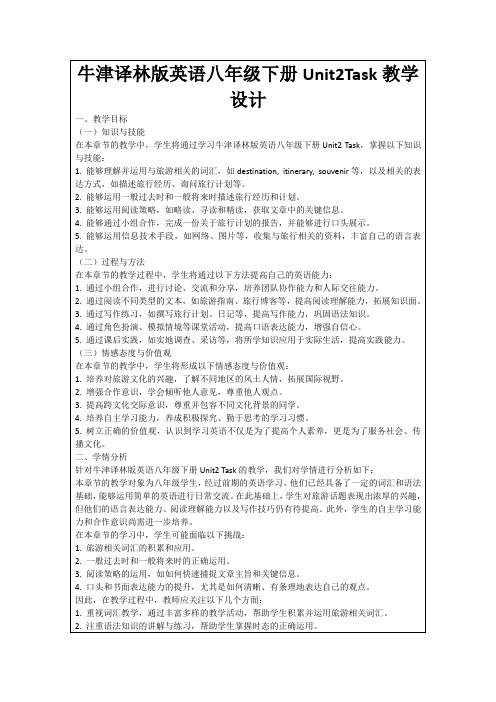
2.阅读策略:指导学生运用阅读策略,如略读、寻读和精读,以提高阅读效率和理解能力。
设想:选取不同类型的旅游文本,引导学生通过实践,学会运用阅读策略捕捉关键信息,并逐步提高阅读速度。
1.通过小组合作,进行讨论、交流和分享,培养团队协作能力和人际交往能力。
2.通过阅读不同类型的文本,如旅游指南、旅行博客等,提高阅读理解能力,拓展知识面。
3.通过写作练习,如撰写旅行计划、日记等,提高写作能力,巩固语法知识。
4.通过角色扮演、模拟情境等课堂活动,提高口语表达能力,增强自信心。
5.通过课后实践,如实地调查、采访等,将所学知识应用于实际生活,提高实践能力。
3.学生完成后,教师及时给予反馈和指导,帮助学生纠正错误并巩固知识点。
(五)总结归纳
1.教师邀请各小组展示他们制定的旅行计划,并让其他学生给予评价和建议。
2.教师引导学生总结本节课所学的旅游相关词汇、语法知识以及如何制定旅行计划。
3.教师强调合作学习的重要性,鼓励学生在课后继续探索旅游话题,将所学知识应用到实际生活中。
-交通和住宿:描述前往目的地及住宿的方式。
-旅行亮点:分享自己最期待的旅行体验,使用一般过去时描述。
-作业提交:请将旅行计划以书面形式提交,要求字数在100-150词之间。
2.口头作业:学生需在课后准备一个关于旅行计划的口头介绍,包括以下内容:
-自我介绍:简要介绍自己。
-目的地:介绍所选目的地的地理位置、特色等。
四、教学内容与过程
(一)导入新课
1.教师以互动提问的方式,引导学生回顾上一单元关于旅行的内容,为新课的学习做好铺垫。
牛津译林版英语八年级上册Unit2Task优秀教学案例
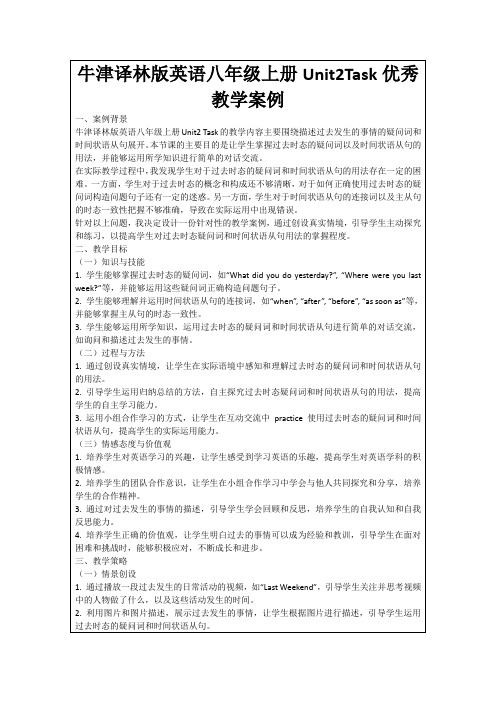
(四)总结归纳
1.归纳疑问词和状语从句:引导学生对过去时态疑问词和时间状语从句的用法进行总结,帮助学生梳理和巩固所学知识。
2.强调时态一致性:强调主从句的时态一致性,让学生明白并掌握时间状语从句的连接词以及主从句的时态一致性的重要性。
2.引导学生运用归纳总结的方法,自主探究过去时态疑问词和时间状语从句的用法,提高学生的自主学习能力。
3.运用小组合作学习的方式,让学生在互动交流中practice使用过去时态的疑问词和时间状语从句,提高学生的实际运用能力。
(三)情感态度与价值观
1.培养学生对英语学习的兴趣,让学生感受到学习英语的乐趣,提高学生对英语学科的积极情感。
2.时间状语从句:讲解时间状语从句的连接词,如“when”, “after”, “before”, “as soon as”等,并强调主从句的时态一致性。
3.运用举例:通过具体的例句和情境,展示过去时态疑问词和时间状语从句的用法,让学生进行观察和理解。
(三)学生小组讨论
1.分组讨论:将学生分成小组,每组学生共同讨论和分享关于过去发生的事情的经历,鼓励学生运用过去时态的疑问词和时间状语从句进行交流。
(五)作业小结
1.作业布置:布置相关的练习题目,让学生巩固和应用所学知识,如编写一个过去发生的事情的对话场景,并运用过去时态的疑问词和时间状语从句进行对话交流。
2.学生展示:鼓励学生在下一节课上展示自己的作业成果,让学生互相交流和评价,提高学生的表达能力和交流能力。
五、案例亮点
1.情境创设:通过播放视频和展示图片,引导学生直观地感知过去发生的事情,激发学生对过去时态的疑问词和时间状语从句的兴趣,提高学生的学习积极性。
高中英语新牛津译林版精品教案《Task(2)》2
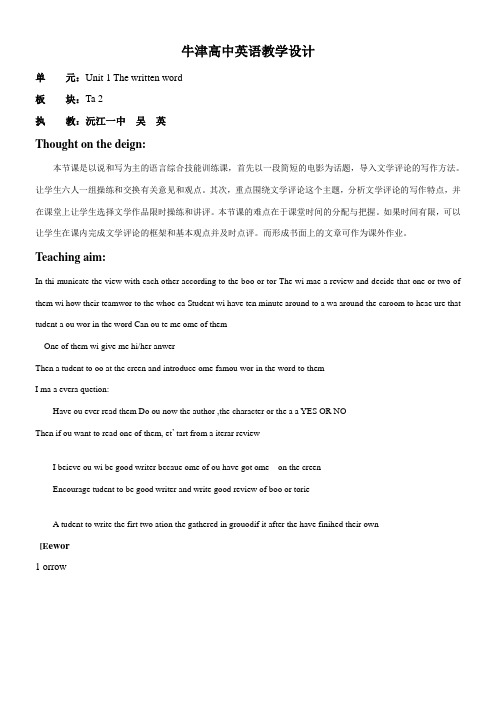
牛津高中英语教学设计单元:Unit 1 The written word板块:Ta 2执教:沅江一中吴英Thought on the deign:本节课是以说和写为主的语言综合技能训练课,首先以一段简短的电影为话题,导入文学评论的写作方法。
让学生六人一组操练和交换有关意见和观点。
其次,重点围绕文学评论这个主题,分析文学评论的写作特点,并在课堂上让学生选择文学作品限时操练和讲评。
本节课的难点在于课堂时间的分配与把握。
如果时间有限,可以让学生在课内完成文学评论的框架和基本观点并及时点评。
而形成书面上的文章可作为课外作业。
Teaching aim:In thi municate the view with each other according to the boo or tor The wi mae a review and decide that one or two of them wi how their teamwor to the whoe ca Student wi have ten minute around to a wa around the caroom to heae ure that tudent a ou wor in the word Can ou te me ome of themOne of them wi give me hi/her anwerThen a tudent to oo at the creen and introduce ome famou wor in the word to themI ma a evera quetion:Have ou ever read them Do ou now the author ,the character or the a a YES OR NOThen if ou want to read one of them, et’ tart from a iterar reviewI beieve ou wi be good writer becaue ome of ou have got ome on the creenEncourage tudent to be good writer and write good review of boo or torieA tudent to write the firt two ation the gathered in grouodif it after the have finihed their own[E ewor1 orrow。
第十课第二课时(译林牛津版八年级英语教案教学设计)

第十课第二课时(译林牛津版八年级英语教案教学设计)一、 Contents of the lesson:Topic: Parts 1, 1.1, 1.2 of Lesson 9Content: Book 3A, a picture, two new words, and two exercises二、 Type of the lessonA new lesson三、 Aims of the lesson1. To learn to talk about how people feel2. To revise and extend the words that are used to express people’s feeling四、 The key points of the lessonThe students can use the following words and expressions in communication:1. tired, thirsty2. How do they feel?They feel hungry/tired. Etc五、 The difficult points of the lessonTo express one’s feeling六、 Procedures1、 Revision (2 minutes)Ask the Ss the following questions:Can you still remember Annie’s letter in Unit2.Can you talk something about the letter? What did Annie say? What was her feeling?2、 Presentation (2 minutes)Open the book and turn to page 24, look at the first picture in part 1.Ask questions like:What game are they playing?Do you think they win the game or lose the game? (answer: win the game)Why do you think so? (answer: they are smiling)How do they feel?3、 Language focus 1 (3 minutes)To master the following expression:“How do you feel?”“I feel …”4、 Practice (part 1.1, 1.3) (5 minutes)Ask the students to write a word from the box below the correct picture, and then ask the students why they think so?5、 Word study (10 minutes)Distinguish “tired” and “tiring”Extend the vocabulary about expressing people feelings. ( form: ask the students to write down as many words as the can) Eg: hot, cold, sick, happy, asleep……6、 Language focus 2 (10 minutes)To master the following expressions: and sentence patterns “What makes you feel like this?”“Why do you feel like this?”1) make / have/ let/ hear sb do sth,那个故事使他大笑起来:The dog makes him laugh2) feel like doing sth=want to do sthfeel like sth= want sth 想要做某事我现在不想跳舞:I don’t feel like dancing now你想要一杯咖啡吗? Do you feel like a cup of coffee?7、 Act (part 1.2) (8 minutes)Present some pictures, ask the students to act out the picture and talk about how he feels and the reason.8、 Summary (2 minutes)Today we have mentioned some expressions:“How do you feel?” “I feel …”“What makes you feel like this?” “Why do you feel like this?”9、 Homework assignment (1 minutes)Write a passage to talk about one of your experiences and your feelings.七、 Multi-media:Book 3A, board, powerpoint。
英语10译林牛津版unit2project教案
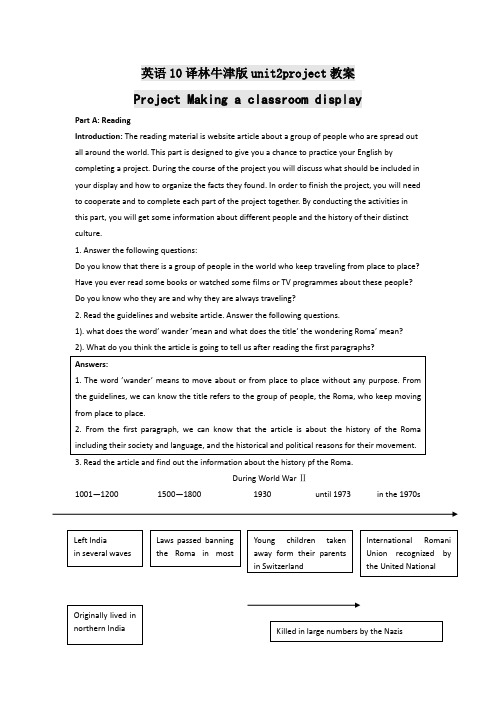
英语10译林牛津版unit2project教案Project Making a classroom displayPart A: ReadingIntroduction: The reading material is website article about a group of people who are spread out all around the world. This part is designed to give you a chance to practice your English by completing a project. During the course of the project you will discuss what should be included in your display and how to organize the facts they found. In order to finish the project, you will need to cooperate and to complete each part of the project together. By conducting the activities in this part, you will get some information about different people and the history of their distinct culture.1. Answer the following questions:Do you know that there is a group of people in the world who keep traveling from place to place? Have you ever read some books or watched some films or TV programmes about these people? Do you know who they are and why they are always traveling?2. Read the guidelines and website article. Answer the following questions.1). what does the word’ wander ’mean and what does the title’ the wondering Roma’ mean?2). What do you think the article is going to tell us after reading the first paragraphs?3. Read the article and find out the information about the history pf the Roma.During World War Ⅱ1001—1200 1500—18001930until 1973in the 1970s4. Read the article once more to point out the two aspects of reasons for the Roma’s movement.Part B:1. Read the passage again and ask each group to discuss the following questions:1). What differences are identified in the article that shows the Roma are a distinct cultural group?2). What examples are given that show European’s prejudice Against the Roma throughout history?2. Group work. Discuss the other six questions of Part B.Homework:1. Read the passage in project and try to remember something about the Roma.2. Surf the Internet and gain more information about Roma.。
英语高三译林牛津版选修10同步精品教案:unit2(task)
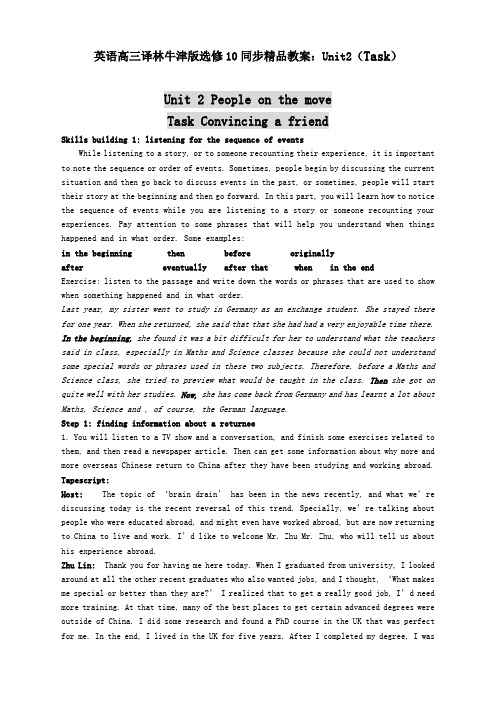
英语高三译林牛津版选修10同步精品教案:Unit2(Task)Unit 2 People on the moveTask Convincing a friendSkills building 1: listening for the sequence of eventsWhile listening to a story, or to someone recounting their experience, it is important to note the sequence or order of events. Sometimes, people begin by discussing the current situation and then go back to discuss events in the past, or sometimes, people will start their story at the beginning and then go forward. In this part, you will learn how to notice the sequence of events while you are listening to a story or someone recounting your experiences. Pay attention to some phrases that will help you understand when things happened and in what order. Some examples:in the beginning then before originallyafter eventually after that when in the endExercise: listen to the passage and write down the words or phrases that are used to show when something happened and in what order.Last year, my sister went to study in Germany as an exchange student. She stayed there for one year. When she returned, she said that that she had had a very enjoyable time there. In the beginning,she found it was a bit difficult for her to understand what the teachers said in class, especially in Maths and Science classes because she could not understand some special words or phrases used in these two subjects. Therefore, before a Maths and Science class, she tried to preview what would be taught in the class. Then she got on quite well with her studies. Now,she has come back from Germany and has learnt a lot about Maths, Science and , of course, the German language.Step 1: finding information about a returnee1. You will listen to a TV show and a conversation, and finish some exercises related to them, and then read a newspaper article. Then can get some information about why more and more overseas Chinese return to China after they have been studying and working abroad. Tapescript:Host: The topic of ‘brain drain’ has been in the news recently, and what we’re discussing today is the recent reversal of this trend. Specially, we’re talking about people who were educated abroad, and might even have worked abroad, but are now returning to China to live and work. I’d like to welcome Mr. Zhu Mr. Zhu, who will tell us about his experience abroad.Zhu Lin: Thank you for having me here today. When I graduated from university, I looked around at all the other recent graduates who also wanted jobs, and I thought, ‘What makes me special or better than they are?’ I realized that to get a really good job, I’d need more training. At that time, many of the best places to get certain advanced degrees were outside of China. I did some research and found a PhD course in the UK that was perfect for me. In the end, I lived in the UK for five years. After I completed my degree, I wasoffered a job by a top company in London. I had thought about coming home to China, but eventually felt that the position was too good to turn down. I also thought that if I worked for a few years in a Western country and learnt how they do things, I could bring that knowledge back to China and become a more valuable employee.Host: Why did you decide to come back?Zhu Lin: By then, many international companies had opened offices in China and I felt that there were new opportunities. I started contacting companies in Shanghai and Beijing to find work before I left London. I set up interviews and found a new job only a few weeks after returning. Do you know what the funniest thing of all is?Host: No. What?Zhu Lin:I stayed abroad because I thought I’d have better opportunities and be able to save more money, but my job here is actually much better than the one I had in London! Host: We have to take a break now, and when we come back, w e’ll take phone calls from viewers at home.2. Listen to the tape again, and check the answers.and try to fill in the blanks.of this phenomenon.Questions:1. What does the phrase ‘brain drain’ mean?2. Why have some Chinese students and workers not returned after they went abroad to study and work?3. What made many Chinese decide to exchange living abroad for a new life in China?4. What has changed in the way people now pay for studying abroad?Not all questions have one simple answer. In fact, most questions have several different responses, and often people want to give complex answer. Complex answers usually involve several different parts, so it is important to make sure that the person you are talking to understands the relationship between the different parts of your answer.●When you give several answers that build on each other or are linked in a way thatone supports the other, using connecting words such as and, also and furthermore.●When the answers you give are contradictory or do not directly agree with each other,use connecting words such as however, but, even though and despite.This part tells you how to use some connecting words to link different parts of a complex answer. If you are able to use these connecting and contrasting words when speaking, you will be able to discuss topics better.1. Group work:Discussion: Read the newspaper article in Part C on page 27 again. Underline connecting words in it and tell the class where one sentence supports another as well as pointing out where two parts are contradictory or do not agree with each other.This part gives you a chance to practice their oral English by doing questions and answers. You are asked to work with a partner to talk about how an overseas Chinese person can prepare to return to China and find a job at home.1. Read the guidelines on page 28 and go through the information listed in the table on page 28.2. Acting: Work in pairs, making a dialogue. One acts as the student and the other as the careers officer. While making the dialogue, you should try to use what they have read in Skills building 2 to give answers.Introduction: when you need to convince someone of something, or get them to agree with your point of view, there are several things to remember. (page 29)1. Find the sentences that correspond to the four points on page 29. And write a passage in convincing language:Use the information you gathered in Steps 1 and 3 to write to your friend, and then you’ll be required to read the letter to your friend or desk partner:Possible example:Dear Lin Hong,I was very happy to receive your letter and hear that you are well. In your letter, you said that you were thinking about returning home and working in China. I have tried to get as much information as possible so that you know how many opportunities you will have in China. China’s rapid development mad the increasing number of international companies registering to do business in China have led a large number of Chinese who have studied and worked abroad to come back because they can get good job and earn more money here. Our government has also introduced new programmes to encourage people to start their own companies, so many returnees have started their own companies and become business owners.As you can see, more and more Chinese have returned. In 2003, there were 45, 00 returnees in Shanghai alone, and many of them are now working as high-level managers, senior engineers or business owners. I watched a TV show where a man named Zhu Lin talked about his experiences of studying and working overseas, and why he came back to China. He went to the UK for five years to get a degree and later he had graduated he got a good job in London. However, he returned to China because more and more international companies were opening offices in China and one of them offered him a job.I think it is high time that you returned home. I have found several institutes or universities that you could teach at. You can have a look at the different institute or universities and decide on two or three appropriate ones and send them your CDS and references from your professors and your employer overseas. I am sure you will find a great job here.Best wishes,Yours,(Student’s own name)Step 4: Homework1 Review this part and make sure you know how to use convincing language2. Preview the project.。
牛津译林版英语必修二Unit2Task1教案
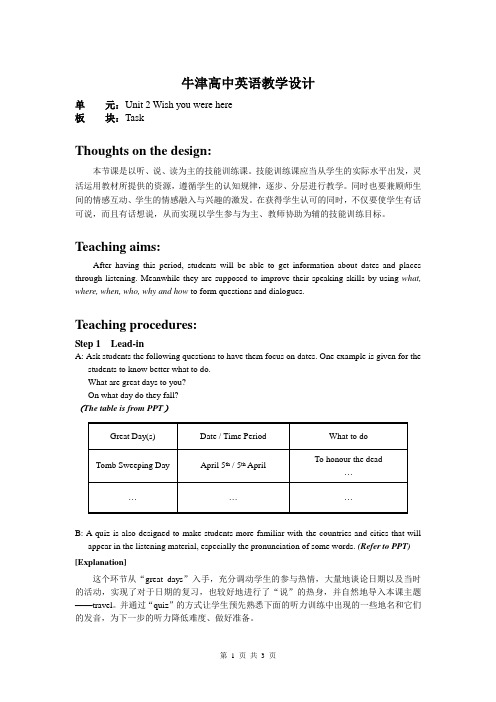
牛津高中英语教学设计单元:Unit 2 Wish you were here板块:TaskThoughts on the design:本节课是以听、说、读为主的技能训练课。
技能训练课应当从学生的实际水平出发,灵活运用教材所提供的资源,遵循学生的认知规律,逐步、分层进行教学。
同时也要兼顾师生间的情感互动、学生的情感融入与兴趣的激发。
在获得学生认可的同时,不仅要使学生有话可说,而且有话想说,从而实现以学生参与为主、教师协助为辅的技能训练目标。
Teaching aims:After having this period, students will be able to get information about dates and places through listening. Meanwhile they are supposed to improve their speaking skills by using what, where, when, who, why and how to form questions and dialogues.Teaching procedures:Step 1 Lead-inA: Ask students the following questions to have them focus on dates. One example is given for the students to know better what to do.What are great days to you?On what day do they fall?(The table is from PPT)B: A quiz is also designed to make students more familiar with the countries and cities that will appear in the listening material, especially the pronunciation of some words. (Refer to PPT) [Explanation]这个环节从“great days”入手,充分调动学生的参与热情,大量地谈论日期以及当时的活动,实现了对于日期的复习,也较好地进行了“说”的热身,并自然地导入本课主题——travel。
牛津译林版九年级英语上册Unit 2 Task 示范课教案)
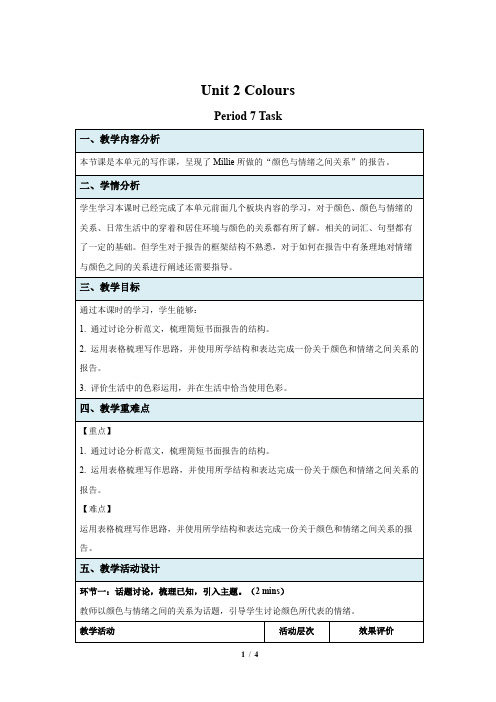
环节四:分析、总结报告结构,梳理出报告框架与内容的写作要点。(5mins)
教师引导学生分析报告的具体写作内容,引导学生关注报告的各个部分的构成以及具体的表达方式,梳理出报告的框架与细节的写作要点。
三、教学目标
通过本课时的学习,学生能够:
1.通过讨论分析范文,梳理简短书面报告的结构。
2.运用表格梳理写作思路,并使用所学结构和表达完成一份关于颜色和情绪之间关系的报告。
3.评价生活中的色彩运用,并在生活中恰当使用色彩。
四、教学重难点
【重点】
1.通过讨论分析范文,梳理简短书面报告的结构。
2.运用表格梳理写作思路,并使用所学结构和表达完成一份关于颜色和情绪之间关系的报告。
colours. Then say out what the colours represent.
活动层次
学习理解之感知与注意
效果评价
观察学生的反馈,了解学生的已知。
环节设计意图:激活学生已知,导入话题。
环节二:在情境中学习新词。(5mins)
教师创设情境,学生在情境中学习新词。
教学活动
2.Studentslookat the picture and guess the girl’s mood. Then fill in the blanks.
6.Students read for the third time and answer the questions.
活动层次
学习理解之感知与注意、获取与梳理、概括与整合
应用实践之分析与判断
效果评价
观察学生的作答情况,了解学生对文章大意及细节信息的理解程度。
译林牛津版必修2高中英语 module2 unit2 task教案
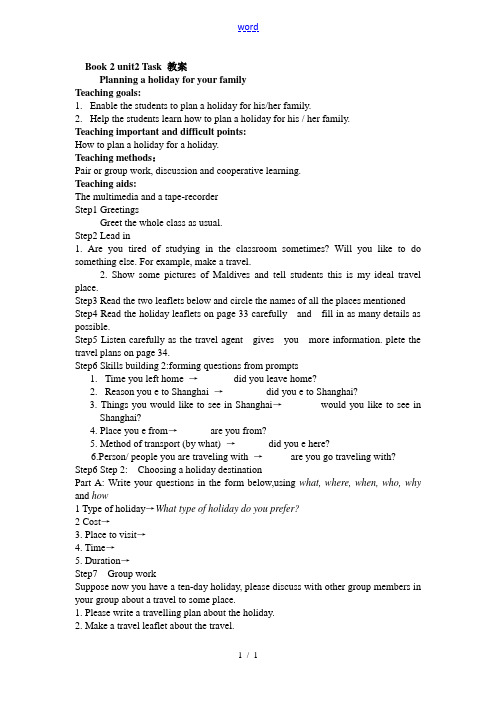
wordBook 2 unit2 Task 教案Planning a holiday for your familyTeaching goals:1.Enable the students to plan a holiday for his/her family.2.Help the students learn how to plan a holiday for his / her family.Teaching important and difficult points:How to plan a holiday for a holiday.Teaching methods:Pair or group work, discussion and cooperative learning.Teaching aids:The multimedia and a tape-recorderStep1 GreetingsGreet the whole class as usual.Step2 Lead in1. Are you tired of studying in the classroom sometimes? Will you like to do something else. For example, make a travel.2. Show some pictures of Maldives and tell students this is my ideal travel place.Step3 Read the two leaflets below and circle the names of all the places mentioned Step4 Read the holiday leaflets on page 33 carefully and fill in as many details as possible.Step5 Listen carefully as the travel agent gives you more information. plete the travel plans on page 34.Step6 Skills building 2:forming questions from prompts1.Time you left home →_______did you leave home?2.Reason you e to Shanghai →________ did you e to Shanghai?3. Things you would like to see in Shanghai→_______ would you like to see inShanghai?4. Place you e from→______ are you from?5. Method of transport (by what) →______ did you e here?6.Person/ people you are traveling with →_____ are you go traveling with? Step6 Step 2: Choosing a holiday destinationPart A: Write your questions in the form below,using what, where, when, who, why and how1 Type of holiday→What type of holiday do you prefer?2 Cost→3. Place to visit→4. Time→5. Duration→Step7 Group workSuppose now you have a ten-day holiday, please discuss with other group members in your group about a travel to some place.1. Please write a travelling plan about the holiday.2. Make a travel leaflet about the travel.1 / 1。
译林牛津模块10unit2Task

Step 2: talking to a careers officer
One asks questions and the other, as a careers officer, gives the answers.
Skills building 3
Go over ‘Population movement in the USA”, the magazine article in the Reading section. Find the sentences that correspond to the four points on Page 29.
Reasons why companies like to hire people who return from abroad.
1.good command of __E__n_g_li_s_h__
2.direct experience of _l_iv_i_n_g_i_n__a_n_o_th_e_r__c_u_lt_u_r_e___
Divide the class into two groups and have a debate.
Which is better, working abroad or working in China?
Step 3: writing a letter to convince people
Useful expressions
in the beginning after that eventually before
in the end when then after
Step 1: finding information
Listen to a TV programme about Zhu Lin, a man who went abroad and returned years later. Fill in the notes below.
牛津译林版英语八年级上册Unit2 Task 精品学案
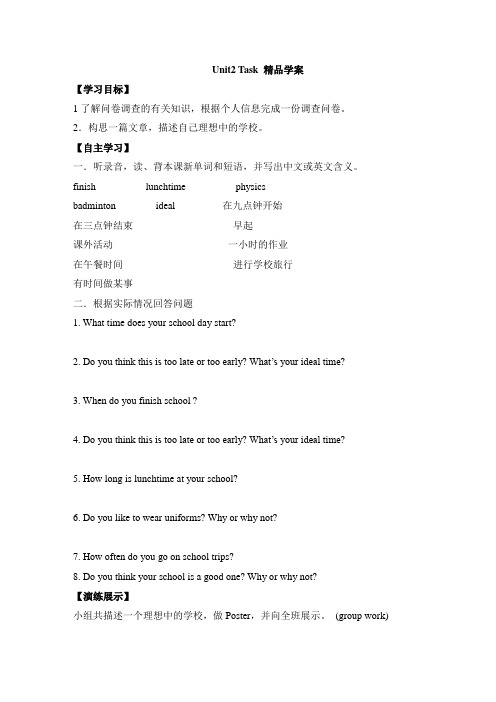
Unit2 Task 精品学案【学习目标】1了解问卷调查的有关知识,根据个人信息完成一份调查问卷。
2.构思一篇文章,描述自己理想中的学校。
【自主学习】一.听录音,读、背本课新单词和短语,并写出中文或英文含义。
finish _________ lunchtime _________ physics _________badminton _______ ideal ______ 在九点钟开始_______________________ 在三点钟结束____________________早起___________________________ 课外活动______________________ 一小时的作业______________________ 在午餐时间______________________进行学校旅行__________________有时间做某事______________________________二.根据实际情况回答问题1. What time does your school day start?____________________________________________2. Do you think this is too late or too early? What’s your ideal time?_________________________________________________________3. When do you finish school ?____________________________________________________4. Do you think thi s is too late or too early? What’s your ideal time?________________________________________________________5. How long is lunchtime at your school?______________________________________________________6. Do you like to wear uniforms? Why or why not?______________________________________________________7. How often do you go on school trips?_____________________ ___________8. Do you think your school is a good one? Why or why not?___________ ____ 【演练展示】小组共描述一个理想中的学校,做Poster,并向全班展示。
高二英语译林牛津版必修二:Unit2TaskSkillsbuilding1教学设计
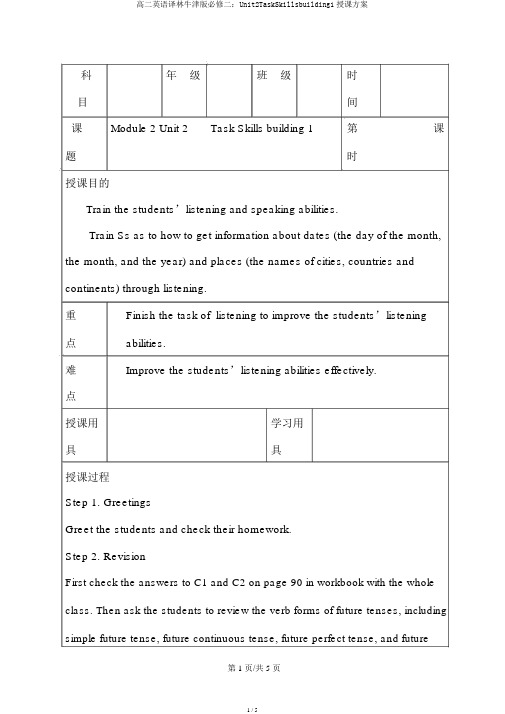
科年级班级时目间课Module 2 Unit 2Task Skills building 1第课题时授课目的Train the students’listening and speaking abilities.Train Ss as to how to get information about dates (the day of the month, the month, and the year) and places (the names of cities, countries and continents) through listening.重Finish the task of listening to improve the students’listening点abilities.难Improve the students’listening abilities effectively.点授课用学习用具具授课过程Step 1. GreetingsGreet the students and check their homework.Step 2. RevisionFirst check the answers to C1 and C2 on page 90 in workbook with the whole class. Then ask the students to review the verb forms of future tenses, including simple future tense, future continuous tense, future perfect tense, and futureperfect continuous tense. Then ask the students to do some practice:I. Multiple choice1.I _________ go shopping when the telephone rang.A. was about toB. was just toC. had toD. wanted to2.-- Are you still busy?---Yes, |I ______ my work, and it won't take long.A. just finishB. am just finishingC. have just finishedD. am just going to finish3.The crazy fans ________ patiently for two hours, and they would wait tillthe movie star arrived.A. were waitingB. had been waitingC. had waitedD. would wait4.Because the shop_______, all the T-shirts are sold at half price.A. has closed downB. closed downC. is closing downD. had closed down5.-- What's that terrible noise?-- The neighbors ________ for a party.A. have preparedB. are preparingC. prepareD. will prepare Keys: I. 1-5ABBCBStep 3. Recognize1. Let's say days of the month, the month or the year in English, such asJanuary 1st, March 2nd, May 3rd, October 9th, 2019, 2019, etc. so as to review the way to express time.When listening for dates, you need to pay attention to three pieces of information:ththe day of the month e.g. the 20the month e.g. Marchthe year e.g. 20192.Read the guidelines on page 32 to learn how to recognize dates and names of places.3.Let's listen to the tape and fill in the table. Before listening to the tape, read the names of the countries and cities given to make sure you know how these names are pronounced.For the first time, the students are asked to finish the first two lines of the form. For the second time, the students are asked to finish the third line of the form. Step4: Read travel leafletsIn this step please try to improve your ability to get useful information by reading travel leaflets and listening to the travel agent. We will first Read two travel leaflets to complete part of the two travel plans, and then finish the plans by listening to the tape.1.Read the first travel leaflet in Part A on page 33, and circle the names of all the places mentioned while reading.高二英语译林牛津版必修二:Unit2TaskSkillsbuilding1授课方案Christchurch Greymouth Queenstown (They are the cities inNew Zealand.)Some new vocabularies of the first travel leaflet:① travel leaflet 旅行宣传册② the travel agent 旅行社③ mention 提到④ bush 矮树丛⑤ axe 斧子⑥ pitsaw 大锯子⑦ seal 海豹⑧ cruise 游船⑨ Maori 毛利2.Fill in Travel Plan 1 on page 34 according to the leaflet you've just read. Ofcourse you won't be able to fill in all the details. You'll have to listen to thetape to get more information.Answers B Travel plan 1(1) South (7)Queenstown (8)traditional Maori (9)Christchurch3.Read the second travel leaflet in Part A on page 33, and circle the names ofall the places mentioned while reading. Some new vocabularies of the firsttravel leaflet:① Baotu Springs 趵突泉② Daming lake大明湖③ the Yellow River 黄河④ Mount Taishan泰山⑤ South Heaven Gate 南天门⑥ Dai Temple太庙⑦ Qufu 曲阜⑧ Confucius孔子4.Fill in the second travel plan according to what you’ve read in the sec travel leaflet.To fill in all the details .you need to listen to the tape to get more高二英语译林牛津版必修二:Unit2TaskSkillsbuilding1授课方案information .Answers B Travel plan 2(12)Ji’ nan (14)Yellow (16)sunrise (18)Dai (19)teahouse (20)birthplace5.Listen to the tape to get more information in order to finish the two plans on page 34Step 5. Summary and Homework板书设计授课后记。
- 1、下载文档前请自行甄别文档内容的完整性,平台不提供额外的编辑、内容补充、找答案等附加服务。
- 2、"仅部分预览"的文档,不可在线预览部分如存在完整性等问题,可反馈申请退款(可完整预览的文档不适用该条件!)。
- 3、如文档侵犯您的权益,请联系客服反馈,我们会尽快为您处理(人工客服工作时间:9:00-18:30)。
●英语10译林牛津版unit2task学案
1.Recently,though,itseemsthattherehasbeenareversalofthisprocessacrossChina. (P27)
然而,最近在中国这种情况大概又有逆转的迹象。
Grammarpoint:Perfectivetense Aperfectivetenseusedtoexpressactioncompletedinthepast;
“`Ihadfinished'isanexampleofthepastperfect”
相关高考试题:
1.
Althoughmedicalscience__________controloverseveraldangerousdiseases,whatworries usisthatsomeofthemarereturning.
A.achieved
B.hasachieved
C.willachieve
D.hadachieve
2.
Theconstructionofthetwonewrailwaylines_______bynow.
A.hasbeencompleted
B.havebeencompleted
C.hascompleted
D.havecompleted
3.
Withthehelpofhightechnology,moreandmorenewsubstances______inthepastyears. A.discovered B.havediscovered
C.hadbeendiscovered
D.havebeendiscovered
4.
Igotcaughtintherainandmysuit____.
A.hasruined
B.hadruined
C.hasbeenruined
D.hadbeenruined
5.
Dannyhardforlongtorealizehisdreamandnowheispopular.
A.works
B.isworking
C.hasworked
D.worked
6.
—______you______himaroundthemuseumyet?
—Yes.Wehadagreattimethere.
A.Have…shown
B.Do…show
C.Had…shown
D.Did…show
7.
Theunemploymentrateinthisdistrictfrom6%to5%inthepasttwoyears.
A、hasfallen
B、hadfallen
C、isfalling
D、wasfalling 答案及解析:1.B2.A3.A4.C5.C6.A7.A
2.Manyofthesehadbenefitedfromthegovernment’snewpreferentialpoliciesencouragingpeopletostarttheirownbusiness.(P27)这些都得益于政府鼓舞兴办企业的优惠政策。
Hereinthissentence,ing-formisusedasanattributive;
相关高考试题:
1.
Thewildflowerslookedlikeasoftorangeblanket_____thedesert.
A.covering
B.covered
C.cover
D.t ocover
2.
Don’trespondtoanye-mails _______personalinformation,nomatterhowofficialtheylook.
A.searching
B.asking
C.requesting
D.question ing
3.
Iwastoldthattherewereabout50foreignstudents_____Chineseintheschool,most __ ___ werefromGermany.
A.study;ofwhom
B.study;ofthem
C.studying;ofthem
D.studying;of whom
答案及解析:1.A2.C3.D
3.Thecombinationofeconomicandcareeropportunities,preferentialgovernmentpolicie sandsponsorshipforstudyingabroadiswhatliesbehindthereversalofChina’sbraindrain.(P27)经济和就业机会方面的缘故,政府优惠政策和对国外留学的资助都在一定程度上促进了中国的人才流失。
1).Theusageof“what”
相关高考试题:
1.
____mattersmostinlearningEnglishisenoughpractice.
A.What
B.Why
C.Where
D.Which
2.
______hereferredtoinhisarticlewasunknowntothegeneralreader.
A.That
B.What
C.Whether
D.Where
3.
.Youcanonlybesureof_________youhaveatpresent;youcannotbesureofsomething_____you mightget
inthefuture.
A.that;what
B.what;/
C.which;that
D./;that
4.
Itisnoneofyourbusinessotherpeoplethinkaboutyou.Believeyourself.
A.how
B.what
C.which
D.when
5.
Choosingtherightdictionarydependson______youwanttouseitfor.
A.what
B.why
C.how
D.whether
6.
Theseasideheredrawsalotoftouristseverysummer.Warmsunshineandsoftsandsmake______ __itis.
A.what
B.which
C.how
D.where
答案:1.A2.B3.B4.B5.A6.A。
